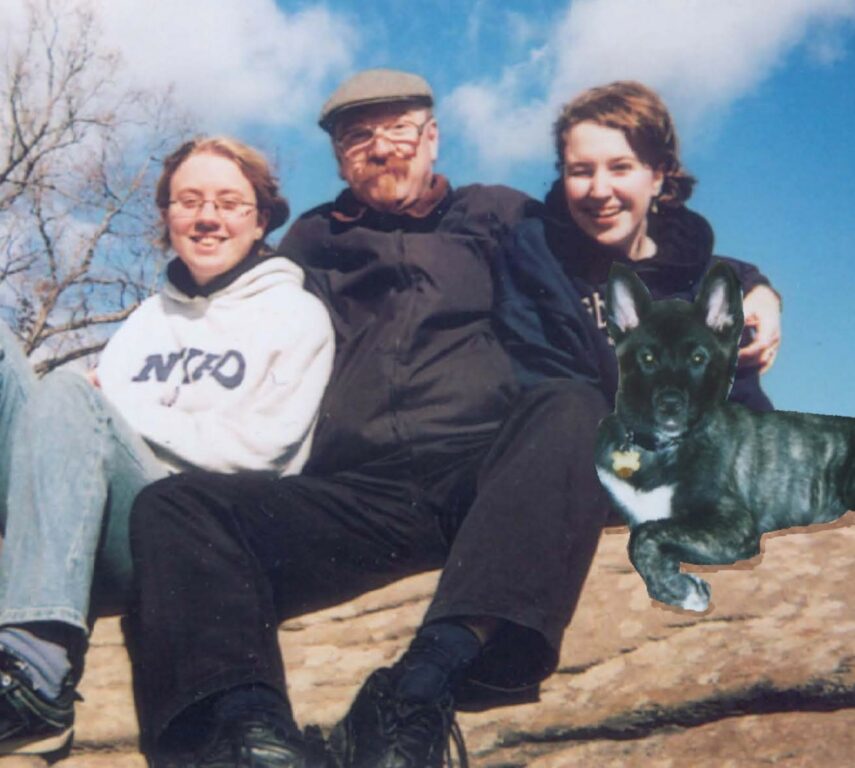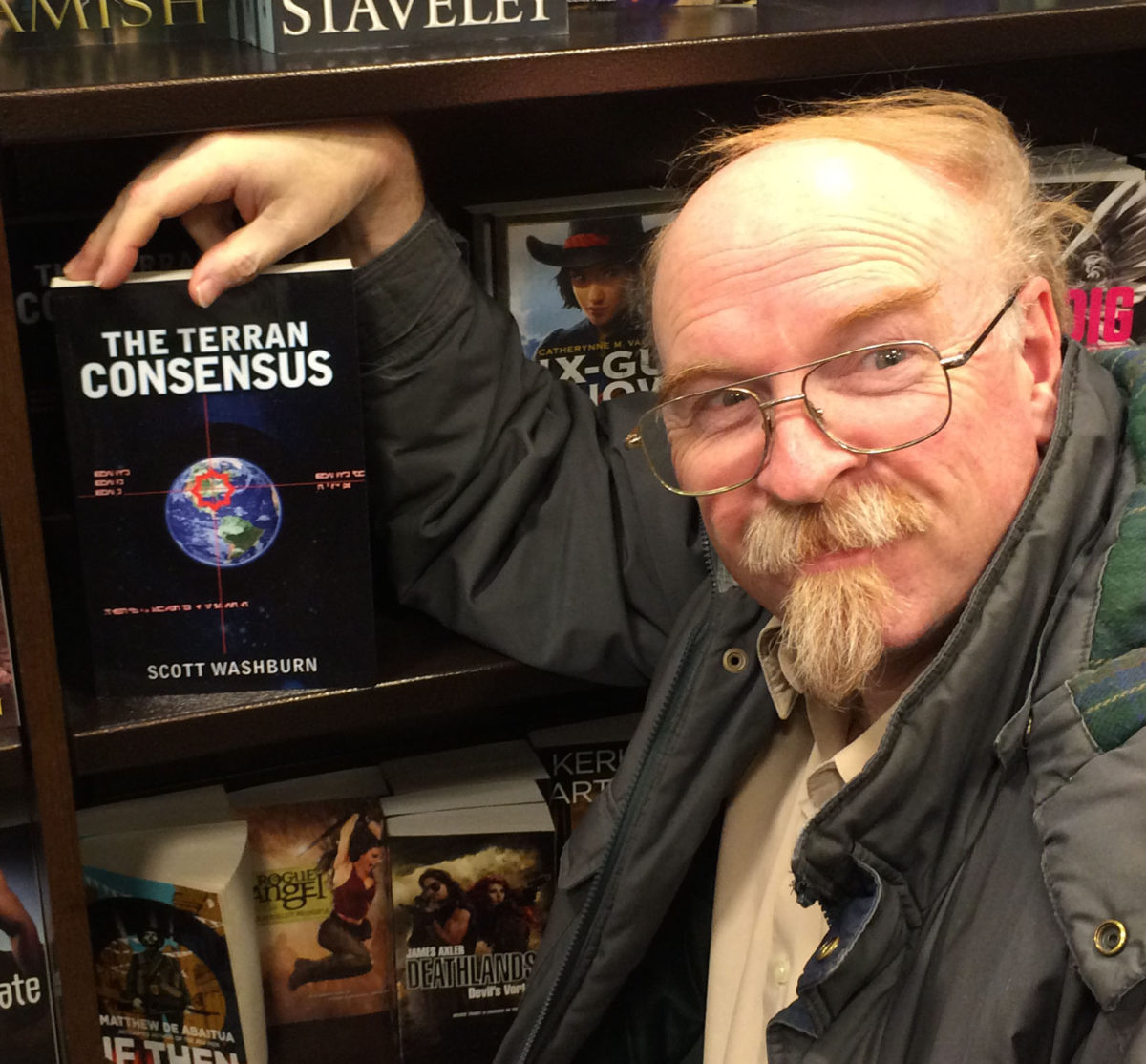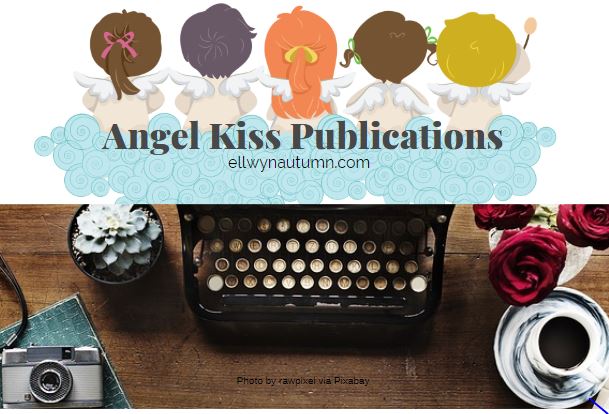
When Scott Washburn agreed to do an interview with me, I was delighted and flattered. He is truly one of the finest authors I have ever met. His writing is dynamic, precise, and engaging.
His world building and character development flow with remarkable consistency that takes the reader on harrowing journeys replete with heroes, villains, and breathtaking description.
I am so glad I’ve gotten to know him and been able to read his work (before it’s published). That’s one advantage of being in the same writer’s group with him. If you meet Scott and he gives you advice, do what I do, sit up and pay close attention.
Now that I’ve introduced you to Scott, let’s get to know him a little better.
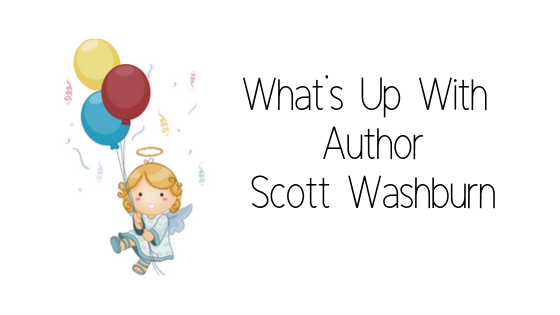
What inspired you to be a writer?
Well, that’s a story in and of itself. I’m not one of these folks who say they’ve been writing since they were a child or that they always wanted to do it.
I didn’t start to seriously write until 1999—when I was 44 years old. But the fact was that I had been preparing to write for a long time before that—even though I didn’t realize it.
I grew up in a house full of books. My parents and my older brothers were avid readers and there were books everywhere.
My mother read to me before I learned to read and once I’d learned, I read everything I could lay my hands on—which happened to mostly be science fiction, fantasy, and history books. I loved to read. I did a third grade book report on Robert Heinlein’s “Starship Troopers”.
Then, in college I stumbled across the game Dungeons & Dragons. It was brand new back then, and I quickly took on the role of a dungeon master—the person who runs the game and makes up the plot for the adventure.
This taught me the art of storytelling—again, without my realizing it. But after college I did not play D&D much anymore and my skills mostly languished.
I wrote some short pieces; I was an avid wargamer and sometimes I would write accounts of some of the games I had played, often adding fictional embellishments; more unintended training.
The final step toward becoming a writer was when I entered graduate school, working on a master’s degree in military history.
I had to write some lengthy papers for that and my advisor, Dr. Russell Weigley, was one of America’s top military historians and also a very good writer. He insisted that my papers not only be well-researched, but well-written.
I learned a lot from him. I got my MA and then went for my Ph.D. Why not? I worked for Temple University and the tuition was free.
But then something totally unexpected happened.
I got interested in an SF book series and found a group of fans on this brand-new Internet thing which had recently popped up. It was a great group of people (many of whom are still close friends).
We discussed the books and did fan sorts of things (designing spaceships and such). And since it was an ongoing book series, we speculated endlessly about what would happen in the next book.
At the time, the heroine had been left in a terrible fix at the end of the last book and we were all dying to know what would happen next. I had made up a sort of list of Things Which Need to Happen in the next book.
But when the book finally came out, there were a number of things which had not been checked off my list. The story itself was fine, but in my opinion it had ended about three chapters too soon and left a LOT of loose ends.
So I stewed on this for a couple of weeks and then did something, which for me, was totally remarkable. I wrote the missing chapters. It was fan fiction, of course, a concept I was only vaguely aware of at that time.
A few weeks work and I had written 30,000 words, something I normally would have considered an enormous chore. I should add that were it not for the invention of personal computers and good word-processing software (something still relatively new at that point in time) I never would have even attempted it.
Unlike many writers I have talked to, I never carry a note pad around with me. I have never written anything of consequence by hand—and I doubt I ever will. And typewriters? Forget it!
So, I had written my chapters and discovered two amazing things. First, I had really enjoyed it. At the time I was eye-deep in the Ph.D. program.
I had just finished a very long and very challenging research paper and was experiencing serious burn-out. But this! I was writing stuff that I didn’t have to research (beyond having read the stories in the series). No footnotes, no bibliography. I could just make stuff up! What a concept!
The second thing I discovered was that I was pretty good at it. I shared what I had written with the other Internet fans and they all loved it. Or so they said. Honestly, it did seem pretty good.
Even reading it now, almost twenty years later it was not a bad piece of work. I had never thought I had any talent for writing. Perhaps I was wrong. Only one way to find out: write some more.
A quick word on fan fiction. Fan fic is a great way for a new writer to get some practice. It allows them to start in an established universe with established characters which allows them to concentrate on a plot without having to do a lot of world-building or character development.
Technically, of course, it is illegal as it does violate copyright. In practice, very few authors openly object to it. They just ignore it. If the fan fic writers are sensible, no one gets hurt and many benefit from it.
So I started writing more fan fiction. I had had an idea for a novel kicking around in my head for many years. It was nothing I ever intended to write, but I had hoped that somebody else would.
When I realized that it would fit perfectly into a fan fiction story set in this other writer’s universe, I was off to the races. I wrote an entire novel and then a second one.
I went from using the original author’s characters to creating my own. By the time I had finished the second one, I was doing a large amount of world-building as well.
Writing the fan fiction gave me all the tools I needed to do my own original stories. Oh, and it was also the end of my Ph.D. ambitions. I wanted to write far more than I wanted that Ph.D.
My fans (I had quite a few by then) told me I wrote well enough to get original stories published. So I started writing original novels. The rest is, as the saying goes, history.
Getting those novels actually published is another story and far too much for this overly long answer. Ellwyn, you will have to do another interview to get that out of me!
I’d love to!
Is writing your full-time profession?
No, my full-time job is as an architectural designer (which is basically an architect who never got around to taking the tests and getting his professional license).
I work at Temple University. But retirement is only a few years away and perhaps then I will become a full-time writer.
How long have you been writing?
As I said, since 1999, so nineteen years.
How many books have you written?
Including my fan fiction, I have fourteen finished novels. Six of them are currently in print with a publisher and two more have been self-published.
I also have a number of short stories and novellas, four of them currently in print.
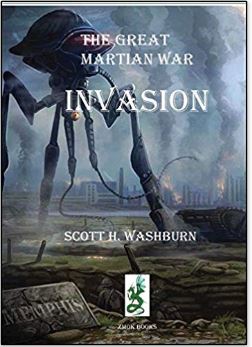
Which genres do you write for?
Primarily science fiction, but a few fantasy stories as well. I suppose my Great Martian War series could be labeled as Alternate History as well as Science Fiction.
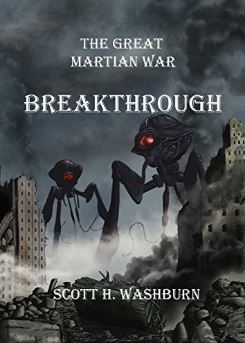
What do you find most challenging about writing for these genres?
That would have to be the world-building. With science fiction and fantasy I often have to create fictional societies and even whole worlds from the ground up.
Science fiction also often calls for new technologies and fantasy requires systems of magic and perhaps gods and religions, too. My Great Martian War series, on the other hand, is set in real locations and in historical times populated with people who really existed.
That calls for a great deal of research to get all the details right. This is all challenging, but also a great deal of fun. My background in history helps a lot there.
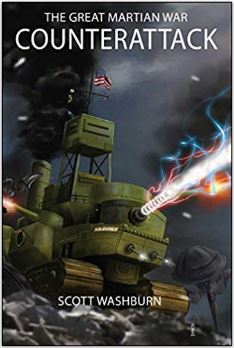
What are you working on now?
I’m working on the fourth book in my Great Martian War series. The first three books were all set in America, but this one is set in the Middle East. So a whole new set of characters and locations to research!
What has been your most rewarding experience since publishing your work?
Oh, there have been a number of things. Seeing my books on the shelves of bookstores has been really exhilarating.
Reading the positive reviews on Amazon and knowing that my works have entertained and even touched and inspired other people is great.
And realizing that I needed to start acting like an author and doing writerly things like attending conventions and joining writers groups—and doing interviews like this–has also been a great deal of fun.
What advice would you give to authors just starting out?
First and foremost: finish things! Don’t just start books, finish them. Anyone can start a story, but it is much, much harder to finish one. And don’t spend ten years trying to make it perfect.
Get it done, start sending it out to agents and publishers, and start writing something else. And if you want to get your work published, get lucky.
The sad truth is that these days getting published is as much a matter of luck as anything else. But I got lucky, maybe you will, too.
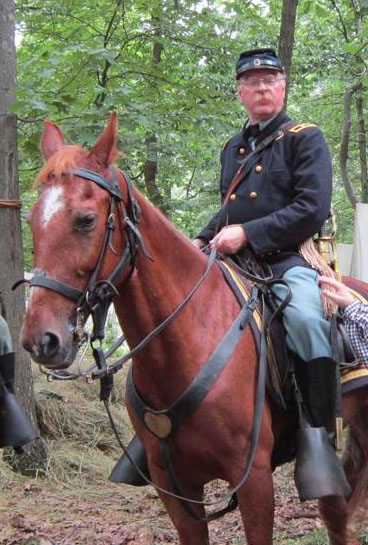
Is there anything else you’d like your readers to know about you?
Before I was a writer I was a historical re-enactor, and before I was a reenactor, I was a wargamer (you know, one of those crazy guys who plays with toy soldiers).
I’ve never been in the military, but I’ve always been fascinated with the military and military history. Those things show through in almost everything I write.
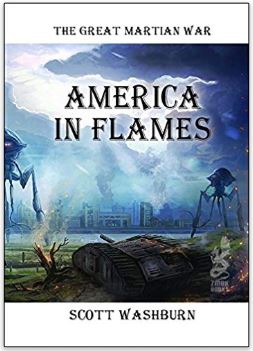
What message are you sharing in your books?
I’m not much for messages. I write good stories. There might be some messages, there, I suppose, but I rarely put them there deliberately.
What are your favorite books?
My favorite writer is Lois McMaster Bujold. She’s the best writer most people have never heard of. She writes SF and fantasy and she’s won more Hugo Awards (SF&F’s equivalent of the Oscar) than anyone, ever.
Her stuff is fantastic. She focuses on characters and creates amazing ones. She taught me the vital lesson that good stories are about people. Not things or places.
If the reader does not care about the people in your story, they are not going to care about the rest of it, either.
What are your favorite movies, TV shows?
TV? Well, I love the Star Trek Series, especially, Next Generation. Documentaries, like Cosmos and the Ken Burns Civil War series are great.
Movies? Well, there are too many of those to list. Classics like Casablanca and Forbidden Planet, many of the old war movies, and of course the first Star Wars movies, and my special favorite SF movie, Avatar.
When you aren’t writing where can we find you?
In my den. Surfing the Net, playing computer games, or painting more of my toy soldiers. Until recently you could have also found me at Civil War reenactments leading my battalion in mock battles.
But I stepped down from my colonel’s position a few years ago and don’t do it all that much anymore. I miss it sometimes, but life moves on.

What inspires you?
Courageous people. Explorers, scientists, soldiers, activists, artists, and yes, writers.
Do you have a website/Facebook page?
Yes. These days, who doesn’t? www.scottwashburn.com
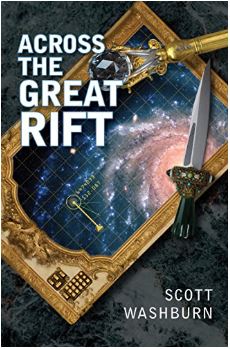
Where can we find your books?
Some you can find in book stores. You can find all of them listed on Amazon.
Thank you, Scott, for spending time with us and sharing your story. We wish you continued success and lots of luck!
